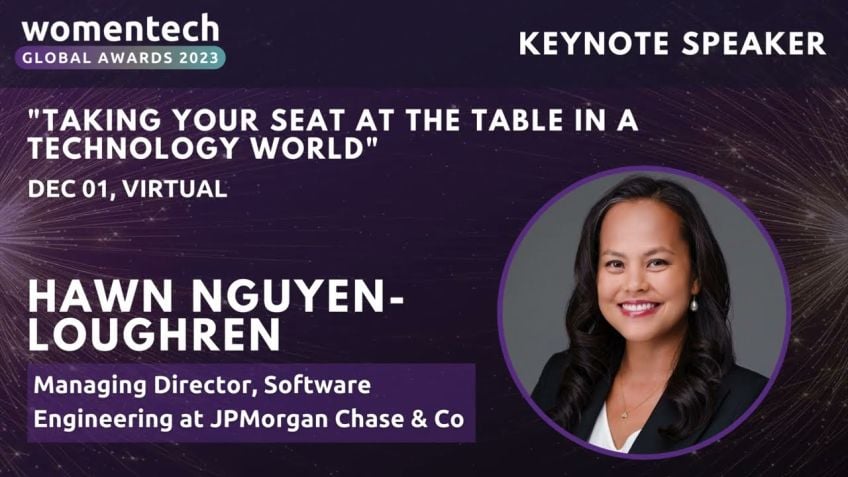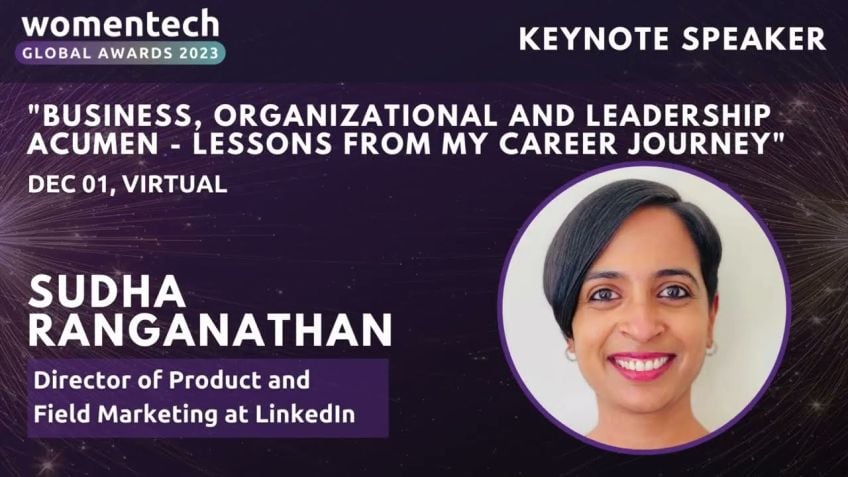Jane Mustoe at the WomenTech Global Awards 2020
Guest Speaker Jane Muston Shares Her Career Journey
In a recent networking event, we had the pleasure of hosting Jane Muston, a well-established name in the financial industry with a rich 19-year corporate career that includes positions such as MD at Berkeley and HR CIO at Tesco. With her background in change management and her roles spread across different business segments, Jane shared valuable insights about her career transitions and the opportunities that have come her way.
Key Career Transitions and Opportunities
Jane discussed her career evolution, highlighting some of the essential transitions and opportunities she faced. From having a successful run at Barclays, where she spent over 10 years, she decided to take on a new challenge and moved to Tesco a year ago. As someone who has held various roles and adapted to their changing demands, she emphasized the importance of seizing opportunities and the potential shifts they can bring.
At Barclays, Jane managed the chance to move into a transformational role for functions technology around compliance, procurement, finance, and HR. This required her to devise strategies to streamline the processes and tackle certain problem areas, broadening her professional horizon.
Challenges and Insights
Transitioning into new functional areas, especially those like HR where she previously only had an end-user experience, did stir some initial doubts in Jane’s mind. She considered whether she could successfully strike a balance in an unfamiliar domain and eventually succeed there. But having been a client of HR as a service, she decided to face the challenges and was open to the learnings the new role had to offer.
Drawn to a particularly troubled area within HR, Jane was tasked to gauge the effectiveness of a strategy implemented a couple of years prior and plausibly reshape the direction it was heading in. With a brief window to evaluate and map out a new course, Jane discussed the significance and pressure of making tough decisions.
Valuable Tips from Jane
- Listen to actively understand: One lesson Jane held close was the importance of listening in bridging knowledge gaps. She stressed that you need to actively listen and understand what's being said and what's left unsaid to develop an effective strategy.
- The jump of faith: Jane encourages professionals to be brave and take on risks regardless of self-doubt. Taking a leap of faith into unacquainted areas broadens your skill base and helps you grow both professionally and personally.
- Risk within boundaries: While taking risks is integral to career growth, one must manage these risks within acceptable boundaries, Jane advises. It’s okay to fail, provided you understand it doesn’t signify the end of the world.
Ultimately, it boils down to having the confidence in your abilities and a strong willingness to learn and explore new paths. Jane’s journey, peppered with risky dockings and displayed resilience, indeed stands as an impressive example of career development and growth.
The lively Q&A session surfaced engaging queries from the audience on building confidence, taking risks, and dealing with failure. Jane’s candid responses offered a reassuring acknowledgment of the common fears that hold us back from taking flight.
Wrap up and Audience’s Takeaways
The attendees were highly appreciative of Jane’s insightful presentation, resonating with her examples and drawing motivation from her career journey. Reflecting on Jane’s advice, one participant pointed out that not taking risks is, in fact, a bigger risk.
Another significant takeaway from Jane's session was the concept of "positive self-talk.” Acknowledging that doubts can creep in even after years of experience, Jane emphasized the power of positive affirmation. She believed that consistently telling yourself that "you can" indeed has its merits.
Jane's inspiring talk serves as a reminder to professionals at all stages of their career that it’s essential to believe you're capable, take risks, and remain resilient.
The networking event concluded with great feedback and a hearty thanks to Jane Muston for her time, insights, and answering the questions from the attendees. We look forward to hosting more such enlightening sessions with industry stalwarts.
Video Transcription
Thank you everyone. Thank you for your comments and you will get a chance. Maybe we can connect with uh Kola on social media on linkedin, for example, or maybe you will encounter her during the networking. And without further ado, I'm very super excited to announce our next speaker.
Her name is Jane Muston. She has a 19 year corporate career in the financial industry, having performed a number of roles specializing in change management. Jane has managed roles globally and across a number of different business segments within the financial industry such as an investment banking, wealth and investment management and corporate. Jane is an MD at Berkeley leading the hr transformation and also Hr Cio at Tesco. Jane is actively involved in the citizenship and diversity inclusion, enable and engage agenda at Berkeley. Hi Jane and welcome. OK, I will leave the stage
to you and enjoy. Excellent. Thank you very much. So, um firstly, uh you know, thanks for inviting me along speech today. Um I wanted to talk a little bit around uh careers and opportunities and, and really um give some examples really through my career around things that I've noticed and things that I think are important. Uh as you go through, I've been working now sort of just over 20 years. And in that time, um you know, I've done a number of different roles but kept certain things true to my core. But I have realized over that time, the importance of taking uh opportunities that arise and, and that sometimes seeking those opportunities out. So as Anna sort of introduced me, I, I was an MD at Barclays, uh I was at Barclays for 10 years and I moved to Tesco actually about a year ago uh where I head up now, the change in technology, it's really a transformation and cio lead for finance and people uh functions in Tesco.
Um And I made that change probably about a year ago. Um And one of the themes that comes through this is uh and you can see on the slide currently is the theme repeatedly. I think throughout my career, I've, I've sort of taken a number of steps and, and the one that I'm going to talk to today was around the move into functions, uh functions, technology. So when I was in Barclays, I got the opportunity to move into a functions, transformation technology role around compliance, procurement, uh finance and, and hr uh really looking at technology and how we were going to transform those areas and those functions to drive uh consistency and a new strategy in terms of the types of technology they use but I also had then the opportunity to address a problem area around hr and some of the challenges that came there.
And I think I've, I've sort of made this a bit more generic, so it's not particularly linked to, to my previous career, but um it could be applied almost like I said to many of the roles and opportunities I've taken. But also even in the current space, I'm in um the sentiment at the beginning here around hr is I have spent, as Anna said, most of my career in investment banking and wealth management and asset management and very much in the product space, uh that's specific to those areas like equities, equity derivatives.
And so my knowledge and, and experience today had been in big technology and big transformational changes uh that, that I was very comfortable with and, and knew, knew well when this opportunity arrived, like, like I said, to move into hr um a number of things went through my, my mind around taking that opportunity.
Um And whether or not one could I do it to, how on earth was I going to move into a space that I really knew very little about. Um apart from being a, a user of, of obviously uh hr as a service. Um and, and how, how was I going to succeed in, in that space? And one of the reasons I'd, I'd sort of been asked to, to think about this as an opportunity was because they'd already got themselves into a position where a couple of years in, uh they'd, they'd gone down a particular route and were reflecting on whether or not the strategy they set out two years early earlier with the right was the right strategy.
Um So when I went in, I had a very short window to uh work through what that strategy and vision needed to be reflecting on what was there already, but really shaping um what was really a, a direction of travel for the next two or three years to really drive some transformational change.
And uh I mean, people talk about transformational change a lot. Uh For me, it really means making a difference to both the, the function that you're working on or business area you work in, but also the consumers of those services. Um as I said, you know, they were well and truly en route to an already sort of well defined and progressed strategy uh that they'd laid out a couple of years earlier, but we're starting to see challenges uh around that. Um And when I talk about making tough decisions, really, it was very much around, I had six weeks to eight weeks to shape this new strategy, but also reflect on either what was working well or what wasn't working well and to advise and shape with uh the senior execs where they wanted to go.
And that influencing meant that I had to assimilate very quickly, uh an understanding of, of the area, but also I had to build relationships quickly to enable some of these very difficult decisions to be made. And they were difficult because we were looking, you know, the recommendation that I sort of came out with after the couple of months, I'd been there was to stop the direction that they'd gone in and that, that's always difficult. And in fact, I think stopping things in, in many respects is more difficult than, than progressing or, or starting things. Um And that's a brave decision that was made by the senior execs at the time to, to actually reflect and stop spending uh the money that they'd already invested and, and move forward. The other thing that became very clear was that the relationships that were in existence between technology and, and age guards had sort of really broken down on both sides and, you know, the, the function themselves and the colleagues within the function didn't feel listened to, they didn't feel that technology wanted to understand their challenges and, and didn't really feel that the strategy that they had been very heavily tech led was really addressing the concerns of both the colleague and, and the functions themselves.
And on the tech side, they felt despondent because it didn't feel like the the function was really listening and they were going off doing their own things and not really investing the time or engaging in the potential strategy and solution that they had. So again, you know, this and I'm setting the scene in the context here because, you know, building those relationships is sort of fundamental and building them quickly. And I said, um I did that repeatedly throughout my career and when I move into these spaces, I've always felt a number of things that come to mind. One is, can you do it? Two is how do you assimilate quickly and how do you leverage all the great skills that you've picked up over the last 20 years? And, and I, and I suppose I got to, you know, what, what would I say to those coming through and what I still tell myself on a regular basis. And the move to Tesco has been one of those instances where I wanted to change. I wanted to believe I could do something differently in a different industry with an organization that has probably over 450 thou, well, roughly 450,000 colleagues and really um understand how I can sort of apply everything I've done in my career to something new.
Um So I could stretch myself and I suppose the big things um that I took away is you've got to have the self belief. Um It's been one of the things that I think is the most challenging uh throughout my career. And II, I have moments and I reflect still on times where I doubt whether or not I can or, or I'm doing the right things and I think that little niggle is healthy in many respects. But it's also the one thing that can, if you're not careful, take over and prevent you being brave enough to go and make the decisions to try something differently and to try something new. And I think you'll find, you know, there are, there are variations in how, uh, you know, styles or individuals and people talk about gender quite a lot. And I know this is a woman in tech event, but I do believe gender is a spectrum and, and you can be quite uh men and women can be on a spectrum where they're very bold or, or are more self reflective um in terms of their styles. And I think it doesn't really matter in terms of the gender, it matters more around believing that you have the right skills and the right tools to make that jump.
Um And I think when you move, the, the big thing that you always got to remember is you're not really there to, to know everything you never can and you never will. And I, I recognize that in Tesco right now more than anything. There's so much I'm learning so much. I have learned in the last 12 months. It's been phenomenal now that for me has been just an amazing experience to go back into an area that I really knew something about in terms of financing people uh in terms of the functions. And I know technology and I've been a cio before and I know data and I know good change and big transformations. But what I didn't know was what it's like to work in a retailer of a scale and popat uh scale of population and scale of uh of operation as big as a Tesco. And therefore, I've learned masses in terms of how to approach things, how to interact. And just a cultural shift from financial services to a retailer has been phenomenal.
And really, for me to really operate and to adapt, I've really had to listen hard and I think listening is probably an easy thing to say and people will tell you that they listen, I include myself all the time. But active listening is is something else. So when you go into someone, you actively listen to those things of what is being actually said, but what's also not being said and, and really try and drill into and figure out what is it that, that people are really wanting to do and, and figuring out through that act of listening, how, how you shape that to enable them to get the outcomes that they want.
But, but people will tell you most of that and that's what you find is is that actually the gaps in knowledge that you have as long as you ask the right questions and actively listen, you really can fill those relatively quickly and then you've got to just go for it, the jump of faith to say do it.
Um And like I said, from personal experience, moving out of Barclays after 10 years, really working on my career in a financial services environment and then moving to Tesco in the end, I, you, you can talk yourself in and out of most things. But if you really are interested in either driving your career upward or more laterally, um and, and just about becoming a depth of expertise, then, you know, taking those challenges and opportunities and really going for it is the key thing you've got to go for it and, and keep the same principles in place around listening, making sure that you change your path at the time that something maybe not quite working, but actively being confident in yourself that you can deliver.
So that's all I wanted to really say today. I'm sure that if you know, people have got questions later, but I just thought it was worth touching on for me, some of the most important things that have stepped out for me in my career. Um And, and you know, the two or three things that I would resonate with if I was, if I was looking at myself 20 years ago. Thank you very
much, Jane. That is really cool. Thank you very much. Uh Excellent feedback. I'm working on stretching myself as we speak. People say so. Thanks a lot. Your examples are on spot. There is a comment from cor an amazing presentation. Excellent examples. Thanks a lot for doing that and we have a couple of minutes for the questions. So please drop the questions in the chat and we will ask them Jane.
Right? Well,
hi Jane. Amazing presentation. Thanks for your support. People were greeting you when you disconnected for a second, people were waiting for you and greeting you like all of them. They were looking forward to your talk. So we have a couple of minutes for the questions. Don't be shy.
Thank you so much.
Let me here
comes almost coming things, Jane. Probably it was everything was clear and inspiring. People took notes and now going to implement, I filled up a whole page of notes. Wonderful, great takeaways. If you, if you take risks and fail, if you took risk and failed, how do you deal with that?
Look, it's always difficult to fail. Um I, I don't think anyone would say it's, it's fun. Uh And it depends on the scale. So I think, you know, um have things and have I taken risks that I failed. Yes. Um I think it's about being reflective but also accepting. So things do go wrong and I say this to, to my teams all the time but, but managing within boundaries, your risk is really important. So making sure you can accept the risk or it's, it's contained as much as possible because, and, and that you set yourself so you can make a jump. Like I, I made the jump to Tesco. That was a big risk in many respects. In my career. I'd been at Barclays, I've been an MD for seven years and II, I was quite happy there and I was doing a really good job but, but there was something niggling about what I do next. And the risk is that this doesn't work at Tesco, I, that could work, that could happen. But for me, it was contained enough that I felt secure enough that if it doesn't work, I'll just have to go back and find another role in financial services and it's not the end of the world, right? Uncomfortable, but it's not the end of the world.
So I would say, you know, think about the risks that you're taking how it feels for you in the context, but be aware that it might and then if it does, it's still not like, you know, I don't want to fail. But, but I do, I do recognize that there are many factors and things and influences that aren't always in your gift as well. Right. You know, I look at the right culture. I, I might not be doing the right things that doesn't, you know, you've got to accept that that could be the case and that's not about you as well. It's not personal it's about setting that framework of risk. So I, I would balance it guys around you being, thinking about those things up front before you do it. But knowing that if it does go wrong, it's not the end of the world and the next opportunity will come up or a piece of work you're doing quite frankly and
sometimes not risking is even a bigger risk. Right? What if you don't risk? What if you don't fail? And what if you don't grow? Right? What then, isn't it a
bigger risk? That's good. Yeah. Yeah. Yeah.
And I think your career and your journey, it's a good example that you've been taking risks and that's, that's where you got to the stage where you are now and I'm, I'm sure you're going to take bigger risk in the future and, and growing professional even. Sure. And here's a question from the Chris. Um, how do you build up your confidence to take risks? What was made for you? Do you tell yourself you can do that or, or just you go in and then you think? Ok, I'm already doing that or
how? Yeah, it's a great question. And look, I, I don't know, there's many insecurities. I, I was lucky. I, I had, uh, certainly when I grew up, my, my parents were very much the advocates that you can really try anything and do anything and, and, you know, you will fail and, and I did it many things when I grew up, I, I was very into music and I didn't always get through the auditions.
I wanted to. And I remember being fundamentally really upset. But I think what really drives you is that you try again and you keep trying and it's more the resilience around that. And I think building resilience sounds simple, but you've got to really know yourself at that point.
And I don't look, I've been working 20 years and, and, you know, I've done lots of great things I think and I've enjoyed my career and there are many more people are much more successful and, and have done phenomenal things when I look out. But what I can do with my own, ok. Well, I've taken myself as far as I can, I've been resilient through the way and I've learned to understand myself. So I do tell myself I can do it. I have real doubts sometimes two week holiday, I can come back and think, oh, my God, what's happened? And am I going to be able to come back and is everything going to be ok? I generally can have that conversation with myself and I think lots of people do that. Right. And lots of people are not sure about can they do the next job? Uh, honestly, I mean, I think, you know, there are people who would use a therapist but, you know, tell yourself you can. Right. And the more you tell yourself, you can honestly, I I there is something in that,
right? So it's, it's important to have a positive self talk, right? If you believe in your son, if you have a negative self talk, that will also will reflect so better to have a positive self
talk. Well, I mean, you're a reflection of that to be doing what you're doing right now with this, you know, it's phenomenal. So you should be very proud.
Thank you very much and thanks for your contribution. It was a great talk and thank you for taking some questions from the audience. It will be great to have you. We're happy to have you again as speaker at our. Thank you very much and if you have some time, stay with us for the networking and for some talks.
Bye bye bye.





